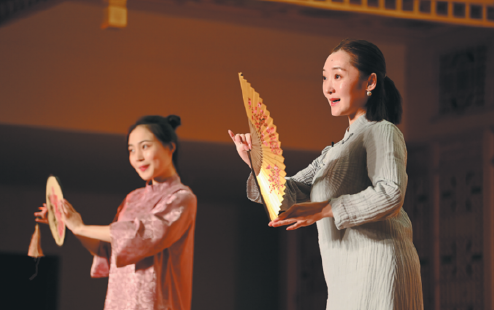Kunqu Opera tunes into modern times

NANJING — In Kunshan, East China's Jiangsu province, the melodies of Kunqu Opera, an ancient art form, are not confined to the stages of grand theaters but ring out in unexpected scenes — school bells, fitness routines and bus stop illustrations where lively cartoon figures greet passersby every day.
Kunshan is the birthplace of Kunqu, which blends poetry, music, intricate costumes and graceful performances. The 600-year-old traditional Chinese performance art was listed as one of the masterpieces of the oral and intangible heritage of humanity by UNESCO in 2001.
But Kunqu is far from a relic. In the bustling streets of Kunshan, this ancient art form continues to find new life, delicately balancing between preserving its timeless beauty and embracing the demands of modernity.
For performers like You Tengteng, an actress at the Kunshan Contemporary Kunqu Theater, the act is both a challenge and a passion. After a long day of rehearsal, You and her colleagues discuss their latest performance strategies not in a traditional theater but on Douyin, a Chinese video-sharing platform.
In partnership with the platform, You and seven other performers livestream their shows for at least 20 hours each month. The goal is simple yet ambitious: to reach a new generation of audiences who might hesitate to sit through a two or three-hour-long performance in an opera house.
One of the challenges is interpretation — not from language to language but from centuries-old art to the flickering screens of smartphones.
To draw audiences in the digital age, the performers have condensed the intricate art form into digestible one-hour segments, inviting viewers to experience Kunqu in more relaxed settings, whether over tea at a cafe or within the walls of a museum.
The strategy seems to be working, particularly among Chinese youth. After performances, it is common to see young fans eagerly lining up for selfies and autographs with the performers. Their newfound enthusiasm for this ancient art is a testament to its evolving relevance.
You was not surprised to see the heartening trend. "The aesthetics of Chinese culture, ancient and modern, are continuous," she says. "What we strive to inherit is not just the technique but the pursuit of beauty that has always existed.
"Kunqu reflects societal values, many of which were born in the feudal era. This tension between the past and present is where we find space for innovation, reimagining the stories of old to resonate with modern audiences," she adds.
One innovation was seen in the Kunshan Contemporary Kunqu Theater's production of The Story of Washing Gauze, a play written in the 16th century. The story centers around Xi Shi, a legendary beauty from ancient China who sacrifices her happiness to serve her country.
In the original ending, after years of separation and war, Xi Shi reunites with her lover and lives happily ever after. However, the modern production altered the ending, leaving it open and tinged with sorrow. The reimagining struck a chord with audiences, many of whom praised the new ending for its emotional depth and realism, noting that it made Xi Shi's character more relatable to modern viewers.
Kunshan's commitment to preserving and promoting Kunqu goes beyond the stage. Over the last few years, the Kunshan Kunqu theater has held more than 2,500 performances and tours, drawing over 20 million attendees from China and abroad.
In addition, the local government has invested 177 million yuan ($25.05 million) to fund new productions, support rehearsal spaces and subsidize performances since 2018.
Kunshan's commitment extends to preserving not only Kunqu but also the diverse opera traditions of China. Since 2018, the annual Chinese Opera Gala (Kunshan) has been hosted by the Ministry of Culture and Tourism and the provincial government. The gala showcases 348 traditional operas, including puppetry and shadow plays, bringing these art forms — many of which are endangered — into the spotlight and providing a platform for artistic exchange.
Wang Wei, a Liuzi Opera actor from Shandong province, performed the role of General Zhang Fei at the gala, a famous character from the classic Chinese novel Romance of the Three Kingdoms.
To play the role more impressively, Wang often learns from the character's other versions and finally creates a brave and lovable general. "This gala is such a good opportunity to learn from each other, I am very happy to stand on this stage to let people learn about Liuzi Opera," Wang says.
In addition to performances, the gala includes training workshops for performers of minor or endangered opera forms. Xu Min, a composer and performer of tea-picking opera from Jiangxi province, has attended these workshops for years.
"If you focus only on your own art, you become isolated," she says. "But here, I'm exposed to many different plays, rhythms and techniques. I feel like a sponge, absorbing everything."
Kunshan's role as the birthplace of Kunqu Opera has positioned the city as a guardian of traditional Chinese opera, says Zhou Wei, Party chief of Kunshan. Through the construction of a museum dedicated to local operas and by hosting the annual national event, Kunshan endeavors to become a space for art exchange and growth.
"We want to create a broad stage for different operas to flourish and integrate traditional culture with the modern world," Zhou says.
Xinhua

Today's Top News
- China and US should jointly safeguard victory of World War II: China Daily editorial
- Nation launches intl program for fusion energy research
- Xi talks with Trump over phone
- Four global initiatives align with Africa's future
- China's model of governance widely praised
- Shanghai jumps to beat of electronic music festival






























